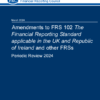
by John McCarthy Consulting Ltd. | Aug 13, 2021 | Blog, News
This is Part 2 of our series of three blogs about the impact that the Coronavirus (COVID-19) is having on evidencing of audit work.
In Part 1 last week, we looked at issues like stock attendance (ISA 501), fraud (ISA 240) and accounting systems and controls (ISA 315). Here are some other problem areas seen during recent audit monitoring inspections.
Going concern (ISA 570)
Going concern has always been a key audit area and remains so, particularly at the moment. Monitoring inspectors often see excellent examples of audit work on going concern including consideration of worst case scenarios when assessing forecasts, and good documentation of the thought processes supporting the auditor’s conclusions on this topic. This will include evidence of scepticism and challenge of management’s assumptions.
In other cases with less than ideal inspection outcomes, audit work on going concern may have been carried out but inadequately documented, or in some cases insufficient audit work on going concern is performed. Areas giving rise to findings on monitoring visits include lack of, or insufficient challenge and assessment of management assumptions or the lack of alternative audit procedures on the audit file, where for example formal future cash flow forecasts are not prepared, particularly on smaller clients. These need to be on file for a period of at least 12 months from the date of sign-off of the financial statements.
Please remember ISA 570 (Revised) (effective for audits of financial statements for periods commencing on or after 15 December 2019) contains increased requirements in relation to audit work on going concern.
Subsequent events (ISA 560)
Inspectors also see cases where there has been a delay in signing some financial statements due to the Pandemic. Don’t forget to ensure that appropriate subsequent events procedures are performed up to the date of the auditor’s report in such circumstances. This should include details of the date/time/place and names of those attending the final close off meeting, even if this s a brief 5-minute phone call. The notes should also contain details of action points agreed and matters forward to the next audit.
Financial Statement disclosures – COVID
There are often comprehensive disclosure in financial statements regarding the impact of COVID. Unfortunately in other cases, there are only brief or no disclosures.
Even where the directors consider COVID has had no impact on the entity, it may still be appropriate to include disclosure in the financial statements to that effect. Disclosure should be sufficient to enable the reader of the financial statements to understand why the directors believe this to be the case. Information disclosed in the directors’ report must be consistent with the information disclosed in the financial statements.
See the final Part 3 of this blog next week.

by John McCarthy Consulting Ltd. | Aug 3, 2021 | Blog, News
The Coronavirus (COVID-19) has caused auditors to develop new techniques in carrying out their audit work, mainly involving greater use of technology. In this, the first blog of our three-part series, we will look at some recent audit monitoring inspection reports that have highlighted the most common problem areas for auditors.
Stock Attendance (ISA 501)
Many firms have not been able to attend clients’ premises for inventory counts. In these circumstances the auditor must attempt to perform alternative procedures e.g., where the client takes a live video call from the auditor and ‘walks’ the auditor remotely through the stock count location. Details of alternative procedures like this, and the auditors’ conclusions following the procedures, must be documented on the audit file. If adequate alternative procedures cannot be performed the audit file needs to document a consideration of the impact on the auditor’s report.
Where audit clients have not traded for significant periods of time, the audit file needs to show some consideration of potential stock impairment or obsolescence. A sceptical approach by auditors is always prudent. The ICAS has issues excellent guidance on attendance at stocktakes during the coronavirus outbreak. It’s worth looking at.
Fraud (ISA 240)
Audit files should fully document consideration of fraud (including the scope for fraud involving Government Covid subsidies/grants), especially where the audit firm may not have direct access to its audit client and/or where audit clients may not have direct access to their customers.
Common findings on monitoring visits include poor or inadequate completion of fraud checklists with no additional consideration documented regarding:
- fraud risk assessment;
- insufficient documentation of discussions between the auditor and management;
- lack of evidence of the auditor’s assessment of fraud and
- lack of evidence of the auditor’s conclusions regarding fraud risk.
Accounting systems and controls (ISA 315)
The Coronavirus (COVID-19) has challenged client’s accounting systems and controls like nothing has ever before.
Audit firms need to consider whether the audit clients’ accounting systems and controls remain appropriate during Covid-19, especially with few or no client staff working from their office location. A common failing at monitoring visits is the carrying forward of systems notes from prior years with little evidence of written assessment of the impact of the Coronavirus on the accounting systems and controls. The notes on file must take account of the impact on the client’s operations of remote working and/trading in an online environment.
See Part 2 of this blog next week.

by John McCarthy Consulting Ltd. | Mar 22, 2021 | Blog, News
Recent feedback from professional accountancy body inspections which readers may find useful, has come to our attention. In no particular sequence, this selection of findings applies mainly to small/medium practices:
- Systems of internal controls – there is only a basic understanding on the file – a more complete understanding (with flow diagrams) could be used properly to help reduce sample sizes and cut down on unnecessary audit work.
- Work in progress – the evidence on the audit file of long term work in progress valuations and estimation of profit allocations, can be improved by auditors attending close out meetings as observers alongside senior client personnel when they are negotiating with third party contractors and/or quantity surveyors.
- Recoverability of debtors – not well supported by evidence on the file. The auditor does not display sufficient scepticism (and seek sufficient, independent, corroborative evidence e.g. latest audited accounts of the debtor) and seems to believe, with little questioning, whatever they are told by management about debtor recoverability.
- Net Realisable Value of some stock lines is verified but other material stock lines are ignored with no explanation given for the lack of consistent approach.
- Valuation of investments/properties – no evidence on the audit file that the impact of Covid has been considered. The file could be improved if there was evidence of the auditor speaking with the valuation expert , even to establish a proper understanding of the basis of valuation.
- Letters of representation – over reliance on these letters to close the gap in audit evidence that is apparent elsewhere on the audit file. For example with letters of support there needs to be sufficient, appropriate audit evidence on the audit file that the third party providing the support is ‘good’ for it i.e. a parent company audited accounts showing their solvency or perhaps the support is provided by a significantly wealthy related party Director, for which there ought to be an up to date statement of their personal financial affairs on the file, ideally prepared by an independent financial adviser.
- Fraud – only a cursory consideration given to this area by accepting management assertions too easily. Audit files need to contain evidence of considering the possibility of Government Covid supports being abused in some circumstances and the related possibility of fraudulent accounting to cover up the abuse.
- Going concern/subsequent events – budgets/forecasts not well evidenced on the file for up to 12 months from the date of approval of the financial statements.
- Identification of related parties – not fully documented on file.
- Long association – Responsible Individual in office longer than 10 years – ‘expect challenge’ to scepticism. Need to evidence hot file or second partner review of independence and any other contentious areas of the file, in line with Section 3 of the Auditor Code of Ethics. . Note that the current Ethical Standard for Auditors (Ireland) will be replaced with effect from 15 July 2021.
At www.jmcc.ie we have recently refreshed most of our letters or engagement templates and added some new ones which may be viewed at this link.

by John McCarthy Consulting Ltd. | Apr 29, 2019 | Blog, News
Tax advocacy is now banned for all audit clients. True or False?
The answer is ‘False’.
To hear why this is false and find out what exactly are the rules surrounding an auditor helping an audit client argue a case with the Revenue Commissioners, go see our online webinar entitled Audit Update where you may download the slides and support materials, all for just €45. On successful completion, receive a CPD certificate for your newly acquired knowledge. Well done!
The webinar, which may be viewed anytime for up to a year from date of purchase, covers the following areas:
- IAASA Audit and Ethical Standards April 2017;
- Planning and independence;
- Fraud;
- Materiality;
- Analytical review and sampling;
- Fixed assets, Debtors, Stock, Bank and Creditors;
- Financial statements review;
- Law and regulations;
- PBSE, Going Concern;
- Audit report;
- The ‘Bannerman’ paragraph;
- Issues on PSD visits; and
- International Education Standard 8 (IES 8).
There are 18 other webinars on various topics – also for €45 each, or you may purchase two at the same time for €80 or five for €190.
All our webinars are accessible at any time (for 12 months from date of purchase) here.
We have also prepared, ready to use, audit engagement and representation letter templates (in Word format) for a company audit assignments, available to purchase online (bulk purchases of 5 or more templates attract a 20% discount), please click on the relevant links.

by John McCarthy Consulting Ltd. | Nov 21, 2017 | News
In our last blog about preparing the reporting accountants report under the ROI Law Society Solicitors Accounts Regulations, 2014, we mentioned that the work involved is a quite onerous and responsible task, and carries with it the requirement for compulsory professional indemnity insurance at a minimum of €500,000.
Many accountants ask themselves the question – would the quality of my work be good enough to allow me to be alert to the following types of scenario that have occurred in legal firms?
- A partner in a law firm stole more than €750,000 from client’s accounts to finance the purchase of land, another payment was for a car worth €5,000, more was used to pay off credit card debts and pay a horse trainer. The sums taken ranged from €400 to more than €250,000, between 2002 and 2008.
- Another solicitor ran up a deficit of €2.4m on Clients’ funds by using money from the estate of a deceased person, along with a loan of €1.5 million from AIB against four properties and used the funds to gamble on ‘contracts for difference’.
To find out more about how watch for these and similar situations, come along to our next seminar on the Solicitors Accounts Regulations on Wednesday 29 November 2017 at 9am to 12.30pm. We will be joined by Seamus McGrath, FCA, Head of Financial Regulation at the Law Society of Ireland.
Wednesday 27 November 2017 9am to 12.30pm (Registration from 8.30am)
Location: Talbot Hotel Stillorgan (old Stillorgan Park Hotel), County Dublin
Price: €105 per person or €280 for three from the same office.
Delegate materials provided. Free parking at hotel.
Booking and further details at this link










